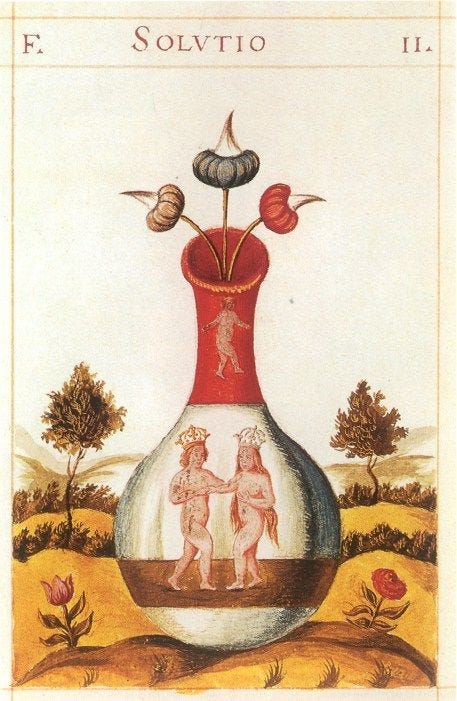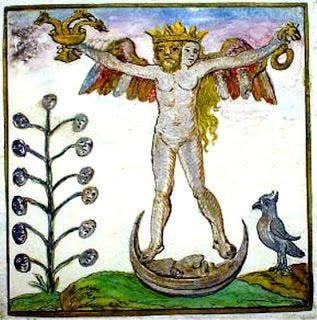One of Carl Jung’s most important concepts is the anima/animus.
Today we’ll talk about the possession and liberation of these figures and the influence they have on us.
First, a bit of definition:
The anima is an archetypal figure that represents the unconscious feminine aspect in a man’s psyche.
But it is not simply a “feminine part” in biological or social terms—it is a deep inner image that arises from the collective unconscious and has a powerful influence.
The animus, on the other hand, is an inner figure that personifies masculine aspects in the psyche of a woman.
But again, it does not refer to external or cultural masculinity, but to a deep archetypal image that also emerges from the collective unconscious.
It refers to the force behind her inner voice, her strength of opinion, judgment, conviction, and rationality.
These are commonly known definitions, but there is another, much more revealing one in my opinion, and it is the one Carl Jung gave in the Zarathustra Seminar:
“The anima would be the personification of the inferior function. The anima feeds primarily on the inferior function.”¹
We could say the same about the animus.
Jung doesn’t state it in the exact same phrase, but his theoretical structure clearly implies it.
Just as the anima represents and feeds on the inferior function in men, the animus in women also emerges from and feeds on their inferior function.
So first let’s understand that the inferior function is the lowest part of our personality, or the least developed dimension of our consciousness.
If you are an introverted thinking type, your inferior function will be extraverted feeling:
You are an excellent internal analyzer, but you struggle to navigate and express yourself in the emotionally rich world stimulated by others.
Conversely, if your dominant function is extraverted sensation, you are deeply connected to the physical here and now, like a boxer in the middle of a fight.
But your weakest point will be introverted intuition—that dreamlike world of ideas that floods reality with possibilities.
This is because thinking is the opposite of feeling (and vice versa), just as intuition is the opposite of sensation (and vice versa).
The problem is that, by nature, our consciousness develops one function, and its opposite is left in the shadows.
Thus, an internal polarity and a shadow are naturally formed.
From there, our anima and animus emerge as forces pulling us into that unconscious territory.
It makes sense, then, that the Self would create something like the anima to mediate between the conscious and the unconscious and assist in the union of opposites.
Why Are We Possessed by Our Anima and Animus?
Carl Jung says something about this:
A man is possessed by his anima due to the fact that his mind does not give the unconscious a chance. It has no vessel or form to receive its contents. The anima is pregnant and he is sentimental about it. It would be like the old Joseph, who is a somewhat pathetic figure (…) He looks at Mary and says: ‘Oh yes, it is wonderful that you are pregnant by the Holy Ghost. Yes, I shall be a holy patron to you. I shall help you. I shall go with you to Egypt.’ But it is a pathetic situation, very uncomfortable. He becomes terribly sentimental about it. That is exactly the situation of a man whose mind does not provide that form, the hermetic container to receive the contents of the unconscious.”²
What happens is that the unconscious takes over, because the conscious ego is not developed or structured enough to hold its contents.
This happens precisely because the modern man—rational, logical, perhaps raised in a patriarchal and Cartesian culture—systematically rejects or ignores his inner world: dreams, emotions, intuitions, fantasies, emotional outbursts.
When the conscious mind lacks structure, unconscious content floods in unfiltered, overwhelming the person.
When a man has not formed his mind (logos) into a strong enough structure, his anima (loaded with unconscious content) will break through without form or filter.
Then he becomes hypersensitive, sentimental, volatile, undefined.
He may fall into mood swings, fantasies, romanticisms, despair, or destructive behavior.
In contrast, possession by the animus appears in another form.
It becomes a sort of inner voice—dogmatic, authoritarian, impersonal.
But the root cause is the same: the woman lacks an internal framework to receive those unconscious contents.
It’s worth noting that in alchemy, the vas hermeticum (hermetic vessel) is the sealed container where transmutation takes place.
Without this container, energy disperses, and the process fails.

It symbolizes the proper internal psychological process by which a person integrates conscious and unconscious aspects of the psyche to achieve self-realization.
Without a container for transformation, the psyche remains split and vulnerable to possession.
Because we lack the proper spiritual work, we also lack the hermetic container with which to cook and transmute our raw psychological matter.
Yet something must fill that void—and what does is the most primitive and unconscious material in us.
Thus, the anima and animus manifest in their most archaic forms, even if we have strong intellects or personalities.
That’s why Jung says:
Even if we are in contact with the animus or the anima—the most vulgar archetypes of all—they are us, but we could not be conscious of them without having been totally caught by them. No woman will know what the animus is without having been identical with it, and no man will know what the anima is without having been filled by it. Speaking of such things, I say: ‘as if’: it would be as if each of these archetypes were stronger than the ego. They dominate us easily and we are possessed as if by lions or bears—that is, by primitive forces that are definitely stronger than us. You see, our prejudice is that we are sitting on the top of the mountain with our consciousness and our will, and that nothing can reach us—but then the unconscious catches us from below.”³
How Do We Free Ourselves from Our Instinctual Anima and Animus?

To begin freeing ourselves and integrating the most instinctual aspects of our anima and animus, Jung used the idea of taking a unilateral attitude—which means learning to recognize and separate what arises from the anima or animus from what genuinely comes from our conscious personality.
This quote explains it very well:
Therefore, I say to a man: you must differentiate between yourself and your anima, between yourself and everything that is contained, thought, or felt through her influence and emotion. To a woman, I say: you must differentiate between yourself and the stream of thoughts running through your head [animus]; don’t assume things are so just because you think so; don’t assume others think the same just because the thought is in you. Criticize it and check whether it’s really yours. When a case of bad animus produces a wonderful opinion, I say: ‘Come on! Is that really you? Do you really support this thought? Are you sure things are like that?’”⁴
Modern individuals often assume their intense feelings and thoughts are fully theirs—when in fact they may be speaking from the unconscious.
When a man doesn’t differentiate himself from his anima, he is easily swept into instinctual behavior, or his thoughts and ideas present him with a barren landscape, unable to perceive beyond the literal.
As a result, his self-esteem suffers, as he believes the “bad” comes from within him.
In the case of women, many believe their opinions and thoughts are “the truth,” and they impose them outwardly and inwardly—even when no logic supports them.
This leads to bad decisions and a pride that prevents neutral discernment.
When the animus dominates a woman, it can distort her judgment and oppress her inner life.
However, seeing through the veil of possession is precisely the first step to begin freeing oneself from it.
It is just the first step, because this is a long process that forms part of full psychological realization.
Freedom from possession requires not just awareness, but a commitment to inner transformation.
Beyond disidentifying from unconscious content, both men and women need a spiritual practice that nourishes the soul and fosters a connection with the transcendent.
This practice must also help them develop their inferior function.
By doing so, they begin to understand the message of the anima or animus and reach an agreement with that powerful figure.
We will explore this further in future chapters.
Remember: I’ve committed myself to deeply studying all of Jung’s work and also to freely sharing what I learn, so my content will always be free. But if you’d like to support my project, I’d gladly accept a coffee:
I also recommend that you read my following publications:
Eros and Logos: How Can We Bridge the Differences Between Men and Women?
Jung: Your suffering is the cure and the greatest thing you've ever produced
Sources:
Notes of the Seminar Given in 1934–1939, Volume 1, December 1935, Session VIII. Carl Jung's commentary on Nietzsche's Thus Spoke Zarathustra.
Notes of the Seminar Given in 1934–1939, Volume 1, Spring Term 1934, Session I.
Notes of the Seminar Given in 1934–1939, Volume 1, Fall Term 1934, Session I.
Notes of the Seminar Given in 1934–1939, Volume 1, Fall Term 1935, Session V.





I’ve read and watched many explanations of anima/animus possession over the years and this is the first that actually makes sense! Thank you!
Great read. Thank you